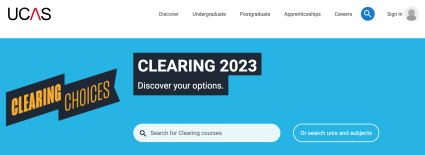It’s A-level results day and hopefully you’ve gotten offers from one or more universities. If you didn’t get any offers, don’t worry, all is not lost. You can still get a university place through a system called UCAS Clearing.
If you didn’t get an offer from any university, read our complete guide about how Clearing works and what you need to do to get a university offer through it.
What is UCAS Clearing?
Clearing is a part of the Universities and Colleges Admissions Service (UCAS) application process. It has two uses. Firstly, it’s beneficial for students who did not get any offers from UK universities but still want to secure a university place. Secondly, it’s a way for universities to fill any unfilled places they have on their courses. Because individual universities use it to fill any course vacancies they have left, in the UCAS Clearing process, you need to contact universities directly to apply for a place.

Who needs to apply through UCAS Clearing?
You’ll need to use UCAS Clearing if you didn’t get any offers from universities or if you don’t meet the conditions of your offer. All applications sent after 30 June are automatically entered into Clearing.
How do I know if I need to apply through UCAS Clearing?
You should check your status in the UCAS Track. If the status is “You are in Clearing” or “Clearing has started” that means you should apply through the UCAS Clearing to get a university place. If your status on Track is neither of these after results day, your university is probably still considering you. You can get in touch with your university directly to check the status of your application if it’s taking a while to update.

Key dates for UCAS Clearing 2023
All applications sent after 30 June are automatically placed into Clearing. UCAS Clearing officially opens on 5 July 2023. You can start searching for university places as soon as you get your exam results. The results day for SQA (Scottish Qualifications Authority) is 8 August 2023, for A Level results it’s 17 August 2023. This year Clearing closes on 17 October. This is the last date to add Clearing choices for universities and colleges to make decisions.
How good are my chances to get a university place through Clearing?
If you didn’t get any offers, or didn’t meet the requirements of your offers, there’s no need to panic. Last year almost 50,000 students were accepted to universities and colleges through the UCAS Clearing. So, if you didn’t get any offers, keep calm and carry on applying. You still have a good chance to secure a place.

Are only unpopular universities and courses available in Clearing?
This myth is not true at all. Also top ranking universities like the University of Edinburgh, King’s College London, the University of Leeds and Coventry University have offered places through Clearing in recent years. It’s not only unpopular courses that are available either. Hundreds of popular courses from law to computer science and from business to mathematics are offered through Clearing.
How do I get a place in a university through UCAS Clearing?
Here is our step-by-step guide for getting a place on a course through Clearing.
1. Be prepared before you enter Clearing
If you get the worst possible news on results day and don’t get any offers, that might be a difficult and chaotic time to start figuring out what Clearing is all about. Don’t panic though. If you don’t really know how Clearing works, don’t rush into the first open course you see. Take your time to go through the list of courses and universities where there are places and think about what and where you want to study. This way you can concentrate your energy and efforts on options that actually interest you.

2. Check what courses are offered through Clearing
Because Clearing is used for filling university places that have not been filled already, the availability of courses changes every year. So your first step should be to figure out what courses are available this year. You can use the UCAS search tool to find out which universities have places available in Clearing for the courses you are interested in. If you definitely want to study in a particular city, you can also use the UCAS search tool to search by location and see what courses are available in your preferred location.
Sometimes Clearing can also help you change your mind, so keep an open mind and see what other courses are available. You might end up wanting to study something you never thought of before! Keep in mind that availability in Clearing changes on a daily basis, so check back regularly. If you find something you know you like, don’t waste time!

3. Seek advice if you’re not sure about your options
If you’re not sure what your options are, don’t lose time by suffering in silence and not knowing what to do. You don’t want to commit to a university or a course that is not right for you either, so talk to people to get a second opinion if you’re feeling unsure about your options. Your sixth form tutor should be able to help, but often it’s also a very good idea to talk to family members or even contact the university you are considering to find out more about what studying at their school is like. You’ll have to do that anyway when you have chosen a course you want to apply to.

4. Contact the university you want to apply to
In the UCAS Clearing, you need to contact the university or college directly to apply for a place. Before you call, make sure you have everything you need on hand:
- Your UCAS Clearing number (you can find it in Track)
- Personal ID Number
- Your grades
- Your original personal statement
- Pen and paper to make notes
Make sure you’re as relaxed and comfortable as possible when you call. Call from a place where there is no background noise so that you can definitely hear each other. You should always call yourself, instead of having a family member or a friend call for you. The call will involve a short interview. This is your opportunity to sell yourself and convince the university that they should offer you a place.
If you are successful and the university wants to offer you a place, they will give you an informal offer over the phone. Make sure you ask them to send a written confirmation of this by email. Remember to take notes of all the important information they give you during the call. It’s easy to get flustered and forget what you have talked about five minutes earlier when you are dealing with important issues like a university place.

5. Confirm your choice in UCAS Track
Once you’ve received an offer from a university for a course you’re happy with and know you want to go for it, log into UCAS Track and click “Add Clearing choice” and fill in the course details by the date the university gave you on the phone. Remember to only do this once you have permission from the university. When you add a Clearing choice in Track, it counts as you definitely accepting an offer, so once the university confirms it, it will show as an acceptance on your Choices page. Because of this, you can only add one choice at a time. However, if the university does not confirm your place, you’ll be able to add another.
What should I do after I’ve secured a university place through Clearing?
After you’ve added a place and the university has confirmed it, pat yourself on the back and celebrate, you’ve gotten yourself a place in a university!

Next step of course if finding somewhere to live during your studies. Student.com is the largest marketplace for student accommodation globally, listing more than one million beds in over 400 cities worldwide. We list accommodation options all over the UK, so wherever you are going to study, Student.com will most likely be able to help you find your perfect home. If you’re pressed for time, check out our guide for finding last minute student accommodation.
